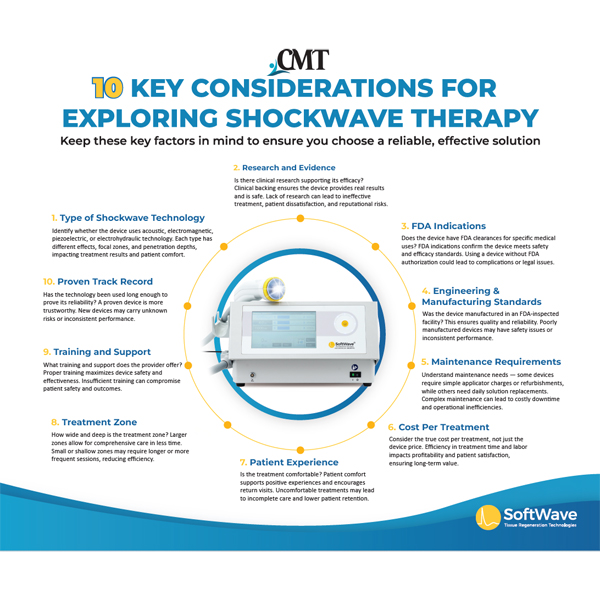
Shockwave Therapy Key Considerations
Download Shockwave Therapy .PDF
Type of Shockwave Technology
Identify whether the device uses acoustic, electromagnetic, piezoelectric, or electrohydraulic technology. Each type of Shockwave Therapy has different effects, focal zones, and penetration depths, impacting treatment results and patient comfort.
Research and Evidence
Is there clinical research supporting its efficacy? Clinical backing ensures the device provides real results and is safe. Lack of research can lead to ineffective treatment, patient dissatisfaction, and reputational risks.
FDA Indications
Does the device have FDA clearances for specific medical uses? FDA indications confirm the device meets safety and efficacy standards. Using a device without FDA authorization could lead to complications or legal issues.
Engineering & Manufacturing Standards
Was the device manufactured in an FDA-inspected facility? This ensures quality and reliability. Poorly manufactured devices may have safety issues or inconsistent performance.
Maintenance Requirements
Understand maintenance needs — some devices require simple applicator charges or refurbishments, while others need daily solution replacements. Complex maintenance can lead to costly downtime and operational inefficiencies.
Cost Per Treatment
Consider the true cost per treatment, not just the device price. Efficiency in treatment time and labor impacts profitability and patient satisfaction, ensuring long-term value.
Patient Experience
Is the treatment comfortable? Patient comfort supports positive experiences and encourages return visits. Uncomfortable treatments may lead to incomplete care and lower patient retention.
Treatment Zone
How wide and deep is the treatment zone? Larger zones allow for comprehensive care in less time. Small or shallow zones may require longer or more frequent sessions, reducing efficiency.
Training and Support
What training and support does the provider offer? Proper training maximizes device safety and effectiveness. Insufficient training can compromise patient safety and outcomes.
Proven Track Record
Has the technology been used long enough to prove its reliability? A proven device is more trustworthy. New devices may carry unknown risks or inconsistent performance.

